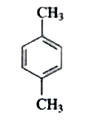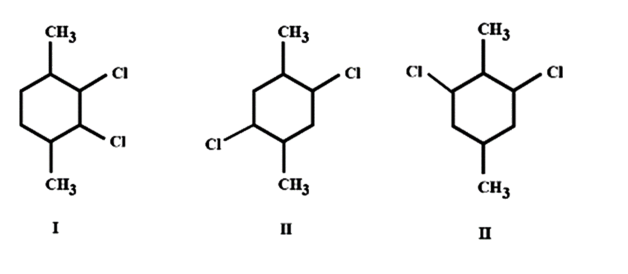Which of the following compound are having white ppt ?
K2Fe[Fe(CN)6]
[Fe(H2O)3(SCN1)]2+
ZnS
Zn(OH)2
The correct Answer is:a,c,d
To determine which of the given compounds produce a white precipitate, we will analyze each compound based on their central metal ion, oxidation state, and the nature of the ligands involved.
1. Identify the Compounds:
The compounds given are:
- K2(Fe(CN)6)
- (Fe(H2O)3(SCN)2)²⁺
- ZnS
- Zn(OH)2
2. Analyze K2(Fe(CN)6):
- Central Metal: Iron (Fe)
- Oxidation State: +2
- Ligands: Cyanide (CN⁻) is a strong field ligand.
- Effect: Strong field ligands cause pairing of electrons. Since all 6 d-electrons are paired, there will be no d-d transition.
- Result: This complex will produce a white precipitate.
3. Analyze (Fe(H2O)3(SCN)2)²⁺:
- Central Metal: Iron (Fe)
- Oxidation State: +3
- Ligands: Water (H2O) and thiocyanate (SCN⁻) are weak field ligands.
- Effect: Weak field ligands do not cause pairing of electrons, leading to unpaired electrons and d-d transitions.
- Result: This complex will produce a red precipitate.
4. Analyze ZnS:
- Central Metal: Zinc (Zn)
- Oxidation State: +2
- Effect: Zinc in +2 oxidation state has no unpaired electrons.
- Result: There will be no d-d transition, resulting in a white precipitate.
5. Analyze Zn(OH)2:
- Central Metal: Zinc (Zn)
- Oxidation State: +2
- Effect: Similar to ZnS, zinc in +2 oxidation state has no unpaired electrons.
- Result: There will be no d-d transition, resulting in a white precipitate.
6. Conclusion:
- The compounds that produce a white precipitate are:
- K2(Fe(CN)6) (1st compound)
- ZnS (3rd compound)
- Zn(OH)2 (4th compound)
Final Answer:
The compounds that have a white precipitate are K2(Fe(CN)6), ZnS, and Zn(OH)2.
The compounds given are:
- K2(Fe(CN)6)
- (Fe(H2O)3(SCN)2)²⁺
- ZnS
- Zn(OH)2
- Central Metal: Iron (Fe)
- Oxidation State: +2
- Ligands: Cyanide (CN⁻) is a strong field ligand.
- Effect: Strong field ligands cause pairing of electrons. Since all 6 d-electrons are paired, there will be no d-d transition.
- Result: This complex will produce a white precipitate.
- Central Metal: Iron (Fe)
- Oxidation State: +3
- Ligands: Water (H2O) and thiocyanate (SCN⁻) are weak field ligands.
- Effect: Weak field ligands do not cause pairing of electrons, leading to unpaired electrons and d-d transitions.
- Result: This complex will produce a red precipitate.
- Central Metal: Zinc (Zn)
- Oxidation State: +2
- Effect: Zinc in +2 oxidation state has no unpaired electrons.
- Result: There will be no d-d transition, resulting in a white precipitate.
- Central Metal: Zinc (Zn)
- Oxidation State: +2
- Effect: Similar to ZnS, zinc in +2 oxidation state has no unpaired electrons.
- Result: There will be no d-d transition, resulting in a white precipitate.
- The compounds that produce a white precipitate are:
- K2(Fe(CN)6) (1st compound)
- ZnS (3rd compound)
- Zn(OH)2 (4th compound)
The compounds that have a white precipitate are K2(Fe(CN)6), ZnS, and Zn(OH)2.
Topper's Solved these Questions
- QUALITATIVE INORGANIC SALT ANALYSISBOOK - CENGAGE CHEMISTRY ENGLISHCHAPTER - QUALITATIVE INORGANIC SALT ANALYSISEXERCISE - Exercises (Multiple Correct) Part-C(Dry Test)
8 Videos
- QUALITATIVE INORGANIC SALT ANALYSISBOOK - CENGAGE CHEMISTRY ENGLISHCHAPTER - QUALITATIVE INORGANIC SALT ANALYSISEXERCISE - Exercises (Multiple Correct) Part-D (Miscellaneous)
20 Videos
- QUALITATIVE INORGANIC SALT ANALYSISBOOK - CENGAGE CHEMISTRY ENGLISHCHAPTER - QUALITATIVE INORGANIC SALT ANALYSISEXERCISE - Exercises (Multiple Correct) Part-A (Analysis Of Anions)
30 Videos
- P-BLOCK GROUP 18 ELEMENTS - THE INERT GASESBOOK - CENGAGE CHEMISTRY ENGLISHCHAPTER - P-BLOCK GROUP 18 ELEMENTS - THE INERT GASESEXERCISE - Ex 5.1 (Objective)
14 Videos
- REDUCTION AND OXIDATION REACTION OF ORGANIC COMPOUNDSBOOK - CENGAGE CHEMISTRY ENGLISHCHAPTER - REDUCTION AND OXIDATION REACTION OF ORGANIC COMPOUNDSEXERCISE - SUBJECTIVE TYPE
4 Videos
Similar Questions
Knowledge Check
Which of the following complex will give white ppt. with BaCl2 solution ?
A[Co(NH3)5SO4]BrB[Co(NH3)5Br]SO4C[Co(NH3)4(SO4)2]BrD[Co(NH3)4Br(SO4)]Which of the following compounds have a dipole moment?
A B
B C
C D
D
Which of the following compounds will have highest melting point?
AChlorobenzeneBo-DichlorobenzeneCm-DichlorobenzeneDp-Dichlorobenzene
Which one of the following compounds will give white precipitate
with tollen's reagent ?
View SolutionWhich of the following compounds will have highest enolic content?
View SolutionWhich of the following compound does not have isolated diene
View SolutionWhich of the following compounds will have highest melting point ?

View SolutionWhich of the following compounds do not have the plane of symmetry?
View Solution